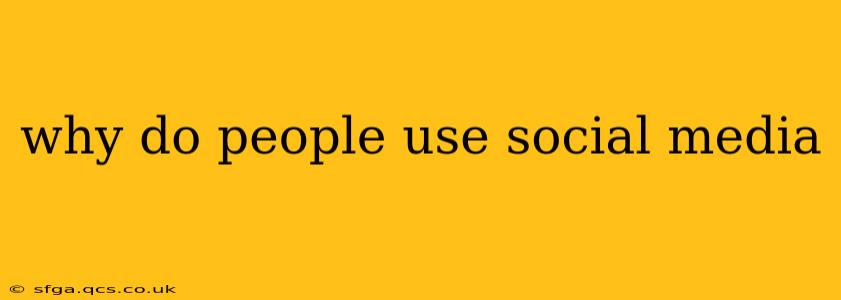Social media has become an undeniable force in modern life, permeating nearly every aspect of our daily routines. But why? What drives billions of people worldwide to spend hours each day scrolling, liking, commenting, and sharing online? The answer, surprisingly, is multifaceted and goes far beyond mere idle entertainment. Understanding the psychology behind social media usage is key to grasping its pervasive influence.
What are the Main Reasons People Use Social Media?
The reasons people use social media are complex and intertwined, but several key motivators consistently emerge. These include:
-
Connection and Belonging: This is arguably the most fundamental reason. Humans are inherently social creatures, driven by a deep-seated need for connection and belonging. Social media platforms offer a readily accessible way to maintain relationships with friends and family, regardless of geographical distance. The ability to instantly share updates, photos, and experiences fosters a sense of community and shared identity.
-
Social Validation and Self-Esteem: The "like" button, comments, and shares act as social currency. Positive feedback on posts boosts self-esteem and reinforces a sense of self-worth. This need for validation can be particularly strong for young people navigating identity formation. However, it can also lead to unhealthy comparisons and anxieties if not managed properly.
-
Information Seeking and News Consumption: Social media has become a primary source of news and information for many. While the reliability of information shared on these platforms can be questionable, the ease of access and the potential for diverse perspectives make it a popular choice for staying updated on current events.
-
Entertainment and Leisure: Social media offers a vast array of entertainment options, from funny videos and memes to engaging games and interactive content. It's a convenient and readily accessible form of leisure, filling downtime and providing a distraction from daily stresses.
-
Community Building and Shared Interests: Social media platforms allow individuals with shared interests to connect and form communities. Whether it's a passion for a specific hobby, a political affiliation, or a shared identity, these online communities provide a sense of belonging and support.
What are the Negative Aspects of Social Media Use?
While social media offers numerous benefits, it's crucial to acknowledge the potential downsides:
-
Addiction and Time Wasting: The addictive nature of social media is a growing concern. The constant stream of notifications, updates, and engaging content can lead to excessive use and detract from other important aspects of life.
-
Cyberbullying and Online Harassment: The anonymity afforded by online platforms can embolden negative behavior, leading to cyberbullying and online harassment. This can have severe mental health consequences for victims.
-
Mental Health Concerns: The curated and often unrealistic portrayals of life on social media can contribute to feelings of inadequacy, anxiety, depression, and low self-esteem. Comparisons to others' seemingly perfect lives can be detrimental to mental well-being.
-
Spread of Misinformation: The ease with which misinformation and fake news can spread on social media is a significant issue, with potential consequences for individuals and society as a whole.
-
Privacy Concerns: The vast amounts of personal data collected by social media companies raise significant privacy concerns. The potential for misuse of this data is a serious issue.
How Can I Use Social Media More Healthily?
It's important to develop healthy habits around social media use:
-
Set Time Limits: Consciously limit your daily social media usage. Use app timers or built-in features to track and control your screen time.
-
Be Mindful of Your Consumption: Actively choose what you follow and engage with. Unfollow accounts that trigger negative emotions or contribute to unhealthy comparisons.
-
Engage Critically: Question the information you encounter on social media. Be wary of biased or unreliable sources.
-
Prioritize Real-Life Interactions: Maintain a balance between online and offline interactions. Make time for meaningful connections with friends and family in person.
-
Seek Support if Needed: If you're struggling with social media addiction or its negative effects on your mental health, seek professional help.
In conclusion, people use social media for a complex interplay of reasons, primarily driven by the human need for connection, validation, and information. While it offers numerous benefits, understanding and mitigating the potential downsides is crucial for harnessing its power responsibly and fostering a healthy relationship with this pervasive technology.
